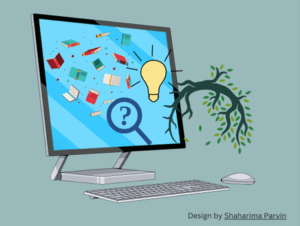Fostering Information Literacy and Lifelong Learning: The Role of Dr. S. R. Lasker Library at East West University
15 September 2025
Information is a powerful tool in today’s digital landscape. It is often said that one who are rich in information are actually the wealthiest in the world. The term Information Literacy (IL), first coined by Paul G. Zurkowski in 1974, refers to the ability to find, understand, and use information effectively. IL involves critical thinking skills that enable an individual to determine their information needs, access reliable sources, analyze gathered data, and implement it effectively in the real world.
Students, as future leaders across all sectors, particularly benefit from IL. Librarians serve as information and digital literacy specialists, possessing comprehensive knowledge and practical expertise in searchability, information source credibility, and the practical application of information in this era of digital technology and Generative Artificial Intelligence (Generative AI).
IL helps students enhance their academic performance by developing critical thinking skills, preparing them for lifelong learning, improving their digital literacy, building research and problem-solving capabilities, and enabling them to navigate today’s world of information overload and misinformation.

Dr. S. R. Lasker Library at East West University (EWU) began its journey in 1996. Since then, through the technological revolution, the library adopted every technological trend to serve its academic community more effectively. This library has evolved into a hub for academic growth, research support, and resource sharing for the EWU community.
As a dynamic academic library, the library started creating information literacy awareness in 2010 and launched an information literacy program in 2013. Since then, the library continues to educate students to realise their potential in a more informative way. The primary objective of this program is to enhance experience in academia and empower the university community with essential skills to access, evaluate, and use information effectively.
In this information-rich world, the ability to navigate information properly is crucial for academic success. The library conducts weekly information literacy programs throughout the year. In this literacy program, the library officials introduce students to both physical and digital information resources, which include journals, e-books, online databases, etc. Additionally, these sessions highlight key services that the library offers to enhance the learning experience, such as research support, citation management tools and support, and interlibrary loan services. Participants also learn about library rules and regulations to ensure that all users can enjoy a smooth and efficient library experience.
The programme supports lifelong learning by teaching effective use of library and information resources. As this library is a digitized one, understanding usage patterns is essential for the academic community to fully utilize the system. While IL programmes are open to all university community members, the library requires completion of an information literacy programme as a mandatory component of library membership.
Reflecting on this initiative, Professor Dr. Dilara Begum, Librarian (In-charge) at Dr. S. R. Lasker library, EWU stated: “In today’s fast-paced, information-rich world, Information Literacy is no longer just a skill—it’s a necessity. At Dr. S. R. Lasker Library, we conduct IL programs to equip learners with the essential capabilities needed to thrive in today’s world. By fostering IL skills, users are able to evaluate information critically, analyze misinformation, disinformation, and fake news, and make informed decisions in their academic and personal spheres of life. We began our journey toward building IL skills with creating awareness about its relevance and importance in 2010. Awareness about information overload was one of the major reasons we started with it. By 2013, we had included IL program as part of our library membership milestones, so that every student and faculty member could appreciate and utilize these vital competencies. Our library is committed to inclusivity and accessibility for lifelong learning by ensuring that students can navigate complexities and make sound decisions.”
The library team also gathers feedback after the program to determine whether more attention is needed. IL programs have received positive feedback from the university community, with many expressing that the sessions have helped them become more confident in their research abilities and use of library resources. Students, especially those in the early years of their academic journey, have benefitted from understanding how to access relevant literature and develop research strategies from the outset.
As the academic landscape continues to evolve, Dr. S. R. Lasker Library, EWU stands at the forefront, committed to empowering its community with the essential skills for lifelong learning and success in research and academia. Through initiatives like the Information Literacy programs, the library ensures that the university remains a center of excellence in knowledge, research, and academic collaboration.
Contributed by Shaharima Parvin, Senior Assistant Librarian and Jannatul Islam Muna, Library Circulation Officer from East West University, Dhaka, Bangladesh